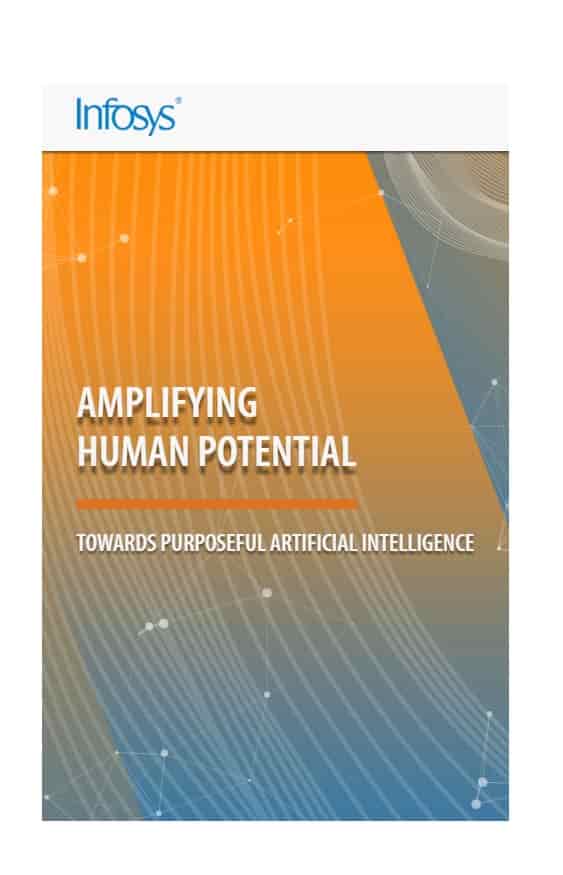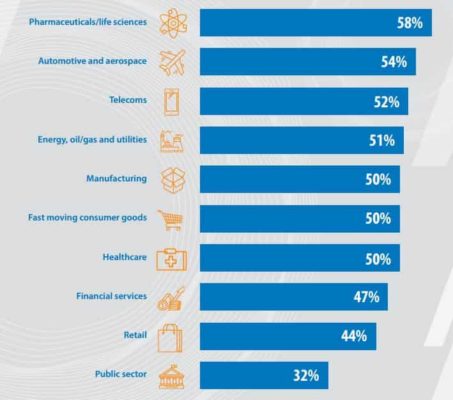
- AI Maturity Index reveals early adopters already reaping rewards
- AI adopters expect 39 percent revenue rise by 2020
- 80 percent of AI adopters replacing roles will retain and retrain employees
Davos, Switzerland – January 17, 2017/Team Estrade//– Infosys (NYSE: INFY), a global leader in consulting, technology, and next-generation services, today released multinational research findings on artificial intelligence (AI) business impact, market maturity and expectations. The research report, Amplifying Human Potential: Towards Purposeful Artificial Intelligence, polled 1,600 senior business decision makers at large organizations across the world.
The report revealed a clear link between an organization’s revenue growth and its AI maturity: Organizations who report faster growth in revenue over the past three years were also more likely to be further ahead when it comes to AI maturity. AI is perceived as a long-term strategic priority for innovation, with 76 percent of the respondents citing AI as fundamental to the success of their organization’s strategy, and 64 percent believing that their organization’s future growth is dependent on large-scale AI adoption. While there are ethical and job related concerns – 62 percent believe that stringent ethical standards are needed to ensure the success of AI – most respondents seem optimistic about redeploying displaced employees with higher value work. The majority, 85 percent, plan to train employees about the benefits and use of AI, and 80 percent of companies replacing roles with AI technologies will retrain or redeploy displaced employees.
Sandeep Dadlani, President & Head of Americas, Infosys, said, “Artificial Intelligence (AI) adoption is on the rise and we are excited to see the investments in AI that businesses are gradually making to derive meaningful and creative change. The achievements are remarkable and the opportunities AI is bringing forth are vast. As we are seeing AI mature and gain momentum, our research shows that the next four years will witness further spikes in interest, and general bullishness about the significant value and benefits that can be obtained through AI adoption. As an industry therefore, we must take necessary steps to ensure AI is developed morally and ethically across every part of society and that employees are actively engaged and provided with the necessary training to be central to this journey.”

Key research findings:
- Businesses expect noticeable AI adoption and growth by 2020: Organizations that have already deployed or have plans to deploy AI technologies expect to see a 39 percent average increase in revenue by 2020, alongside a 37 percent reduction in costs. 76 percent of IT and business decision makers see AI as pivotal to the success of their organization.
- Businesses plan to invest in skills development: In 80 percent of cases where companies are replacing roles with AI, organizations are redeploying or retraining staff to retain them in the business. Furthermore, 53 percent are specifically investing in skills development. Organizations that have fewer AI related skills are more likely to re-deploy workers impacted by AI adoption, whereas those with more AI-related skills are more likely to re-train employees, according to the study. The leading industries that plan to retain and retrain their workers are: fast-moving consumer goods (94 percent); aerospace and automotive (87 percent); energy, oil and gas (80 percent); and pharmaceutical and life sciences (78 percent). The research reveals AI will cause greater investment in workforces, specifically China (95 percent), France (90 percent), Germany (89 percent), the UK (82 percent), and the US (76 percent).
- Addressing ethical concerns is essential for AI success: Two-thirds of those surveyed have not fully considered the ethical issues related to AI, such as employee concerns about handing over control, and industry regulations. Further, 90 percent say their organization’s employees face challenges or concerns with AI adoption, and 88 percent report challenges or concerns from customers and suppliers. In total, 53 percent agree that ethical concerns are a significant obstacle to effective application of AI technology.
- Market and Industry results show differences: Based on the responses, companies in India and China are much more likely to state that they are ahead of their industry competitors when it comes to AI use, followed by Germany, the US, UK, France. Fast moving consumer goods (57%) and telecoms (48%) are much more likely to report that they have already felt AI disrupting their sector. Pharmaceuticals and life sciences reported the widest usage of AI technologies that are working according to their expectations, leading to the highest AI Maturity Index scores by industry.
- Businesses are at the start of their AI journey: Only one in ten respondents that have deployed AI technologies believe that their organization is fully maximizing the current available benefits and capabilities of AI. The majority (90 percent) report that their organization’s employees face challenges or concerns relating to the adoption of AI. Around four in ten respondents believe that the time to implement, ease of use and the interoperability with other systems and platforms are areas of AI that require the most improvement before it can be effective in their organization. There are also areas of AI adoption that need to be addressed with training, education and transparency in the workplace. Safety of data (43 percent), job security (40 percent) and pay rates (30 percent) are the foremost areas of workforce concern despite the broadly positive outlook for AI adoption.

Other key research findings include:
- AI in action: Big data automation (65 percent) and predictive/prescriptive analytics (54 percent) are the primary AI applications today. On average, the companies surveyed have invested $6.7 million in AI in the last year, and have been actively using AI for an average of two years. The IT department is the leading adopter (69 percent), followed by operations (34 percent), business development (33 percent), marketing (29 percent) and commercial, sales and customer services (28 percent).
- Risk and reward: 71 percent agree the rise of AI in the workplace is inevitable, citing positive change for business prospects, employees and society. However, over half (51 percent) admit that cost reduction is an area of AI that requires the most improvement before it can be effective for their organization.
- Deployment: 88 percent also report that their organization’s customers and suppliers face challenges and concerns relating to the adoption of AI. Four in ten point to a lack of understanding of the benefits and intended uses for it, while 38 percent flag a general mistrust of the technology. A similar number (37 percent) indicated their preference to work alongside and interact with human workers rather than machines.
Overall, the study demonstrates the role AI can play in business growth, create opportunities for people to do more than what their current job and education enables, and drive long term macro environment benefits. Decision makers believe AI will bring out the best in their organization’s people (65 percent), and feel it can deliver positive societal (70 percent) and economic (76 percent) change.
For a full copy of the report and AI maturity index, please visit: Infosys.com/AImaturity
METHODOLOGY –
The research report, Amplifying Human Potential: Towards Purposeful Artificial Intelligence, commissioned by Infosys and conducted by independent research agency Vanson Bourne, polled 1,600 senior business decision makers at large organizations across seven markets.
For the purposes of this research, AI was defined as an area of computer science that emphasises the creation of intelligent machines that work and react like humans. Some of the activities computers with AI are designed for include speech recognition, learning, planning and problem solving. Examples of applied AI technologies include but are not limited to: machine learning, predictive/prescriptive analytics and avatar technologies.
About Infosys Ltd
Infosys is a global leader in technology services and consulting. We enable clients in more than 50 countries to create and execute strategies for their digital transformation. From engineering to application development, knowledge management and business process management, we help our clients find the right problems to solve, and to solve these effectively. Our team of 199,000+ innovators, across the globe, is differentiated by the imagination, knowledge and experience, across industries and technologies that we bring to every project we undertake.
Visit www.infosys.com to see how Infosys (NYSE: INFY) can help your enterprise thrive in the digital age.
Safe Harbor
Certain statements in this press release concerning our future growth prospects are forward-looking statements regarding our future business expectations intended to qualify for the ‘safe harbor’ under the Private Securities Litigation Reform Act of 1995, which involve a number of risks and uncertainties that could cause actual results to differ materially from those in such forward-looking statements. The risks and uncertainties relating to these statements include, but are not limited to, risks and uncertainties regarding fluctuations in earnings, fluctuations in foreign exchange rates, our ability to manage growth, intense competition in IT services including those factors which may affect our cost advantage, wage increases in India, our ability to attract and retain highly skilled professionals, time and cost overruns on fixed-price, fixed-time frame contracts, client concentration, restrictions on immigration, industry segment concentration, our ability to manage our international operations, reduced demand for technology in our key focus areas, disruptions in telecommunication networks or system failures, our ability to successfully complete and integrate potential acquisitions, liability for damages on our service contracts, the success of the companies in which Infosys has made strategic investments, withdrawal or expiration of governmental fiscal incentives, political instability and regional conflicts, legal restrictions on raising capital or acquiring companies outside India, and unauthorized use of our intellectual property and general economic conditions affecting our industry. Additional risks that could affect our future operating results are more fully described in our United States Securities and Exchange Commission filings including our Annual Report on Form 20-F for the fiscal year ended March 31, 2016. These filings are available at www.sec.gov. Infosys may, from time to time, make additional written and oral forward-looking statements, including statements contained in the company’s filings with the Securities and Exchange Commission and our reports to shareholders. In addition, please note that any forward-looking statements contained herein are based on assumptions that we believe to be reasonable as of the date of this press release. The company does not undertake to update any forward-looking statements that may be made from time to time by or on behalf of the company unless it is required by law.
SOURCE: Infosys – Infosys.com/AImaturity
Infosys Study: AI Adoption Driving Revenue Growth for Businesses





